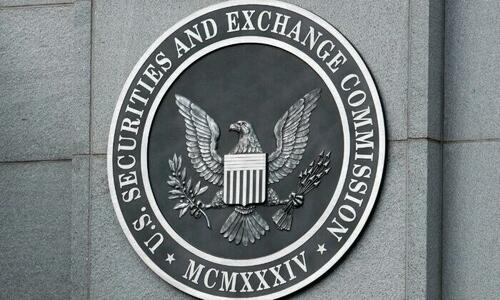Authored by Naveen Athrappully via The Epoch Times (emphasis ours),
U.S. regulators have approved a nonstop stock exchange to begin operations in the country, which is expected to boost overnight liquidity available to traders.
 The U.S. Securities and Exchange Commission in Washington on Sept. 18, 2008. Chip Somodevilla/Getty Images
The U.S. Securities and Exchange Commission in Washington on Sept. 18, 2008. Chip Somodevilla/Getty Images“24 Exchange announced today that it has received approval from the U.S. Securities and Exchange Commission to operate 24X National Exchange as the first national securities exchange in the U.S. that allows trading of U.S. securities 23 hours each workday,” the company said in a Nov. 27 statement.
The exchange will be launched in two steps. In the first stage, it will operate between 4 a.m. ET and 7 p.m. ET on weekdays beginning in the second half of next year.
In the second stage, trading will be offered between 8 p.m. ET on Sunday through 7 p.m. ET on Friday. Every trading day will have a one-hour operational pause aimed at allowing the company to conduct tests and upgrades.
Dmitri Galinov, the founder and CEO of 24 Exchange, called the SEC approval a “thrilling development.”
“With this historic SEC approval in place, we will build and operate a customer-driven Exchange that can rapidly align with market demands and adapt quickly to client feedback,” he said.
Galinov pointed out that traders are often at risk when markets remain closed at their geographical location. Traders are not able to quit positions when major and sudden events unfold.
The 24X National Exchange seeks to solve this issue by offering around-the-clock trading, he noted. Initially, the exchange will seek to boost overnight liquidity for American equities by tapping into trading volumes from the Asia Pacific region.
Some procedures are pending, including making additional filings with the SEC, before the 24-hour trading is activated, the company said.
Benjamin Schiffrin, the director of securities policy at market advocacy group Better Markets, criticized the SEC approval of 24X National Exchange, warning that this harms investors and damages markets.
Allowing overnight trading subjects retail investors to new risks, he said. “Retail investors trading during an overnight session will be trading in a market where there are few buyers and sellers, and where prices will be more volatile and less favorable than during normal hours.”
“This means that, during overnight sessions, retail investors will only get the best prices in a bad market, thereby losing money if they had traded during normal business hours,” he said.
Risky Behaviors
Schiffrin noted that people tend to engage in “riskier behaviors” during nighttime.
Trading platforms may send notifications and prompts at night when traders are “particularly susceptible” to inducements and allow people to easily trade with just a simple push of a button.
He provided an example of legalized sports betting that entices people to bet with ease, thus leading to a “gambling addiction crisis.” The financial industry could use similar tactics to hook investors into trading that can have “potentially serious consequences,” Schiffrin said.
In comments submitted to the SEC, two researchers from the University of Washington and Stanford University suggested that increasing trading hours could reduce net gains made by retail investors.
They said that during pre-market and post-market sessions, liquidity tends to be low, volatility high, and prices “arguably less informationally efficient.”
“Our research indicates that retail investors systematically underperform during these types of conditions,” they said.
“While attracting more volume to these sessions is presumably the intention of 24X Exchange, the majority of trading activity will likely remain in the daily market session, meaning these issues will remain salient for out-of-hours retail traders.”
24X National Exchange’s approval comes as the NYSE revealed in October that it plans on extending weekday trading time at its Arca equities exchange to 22 hours per day.
With this update, trading during weekdays will operate between 1:30 a.m. and 11:30 p.m. ET. The fully electronic exchange will offer all stocks, ETFs, and closed-end funds listed in the United States for trading.
Source link

